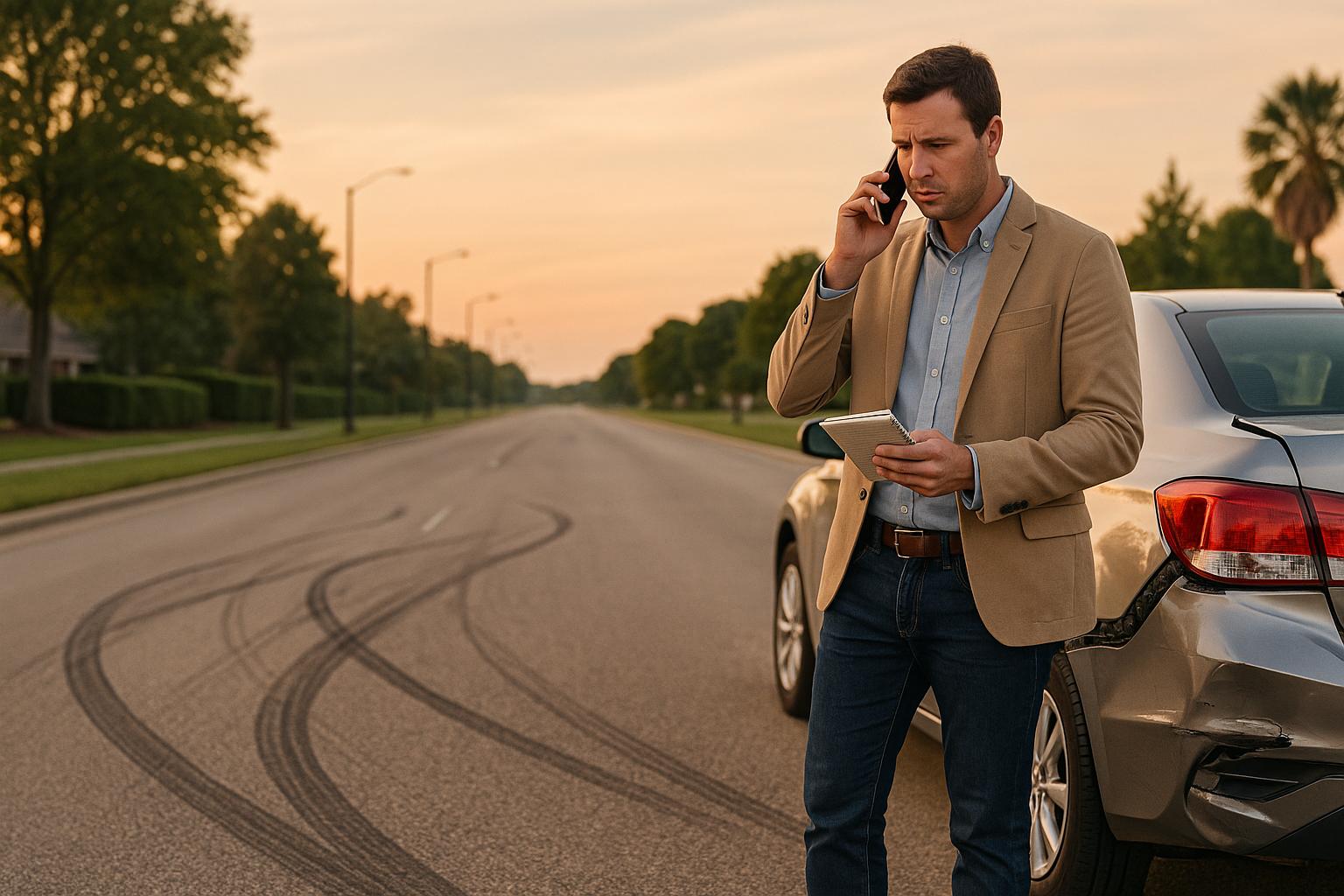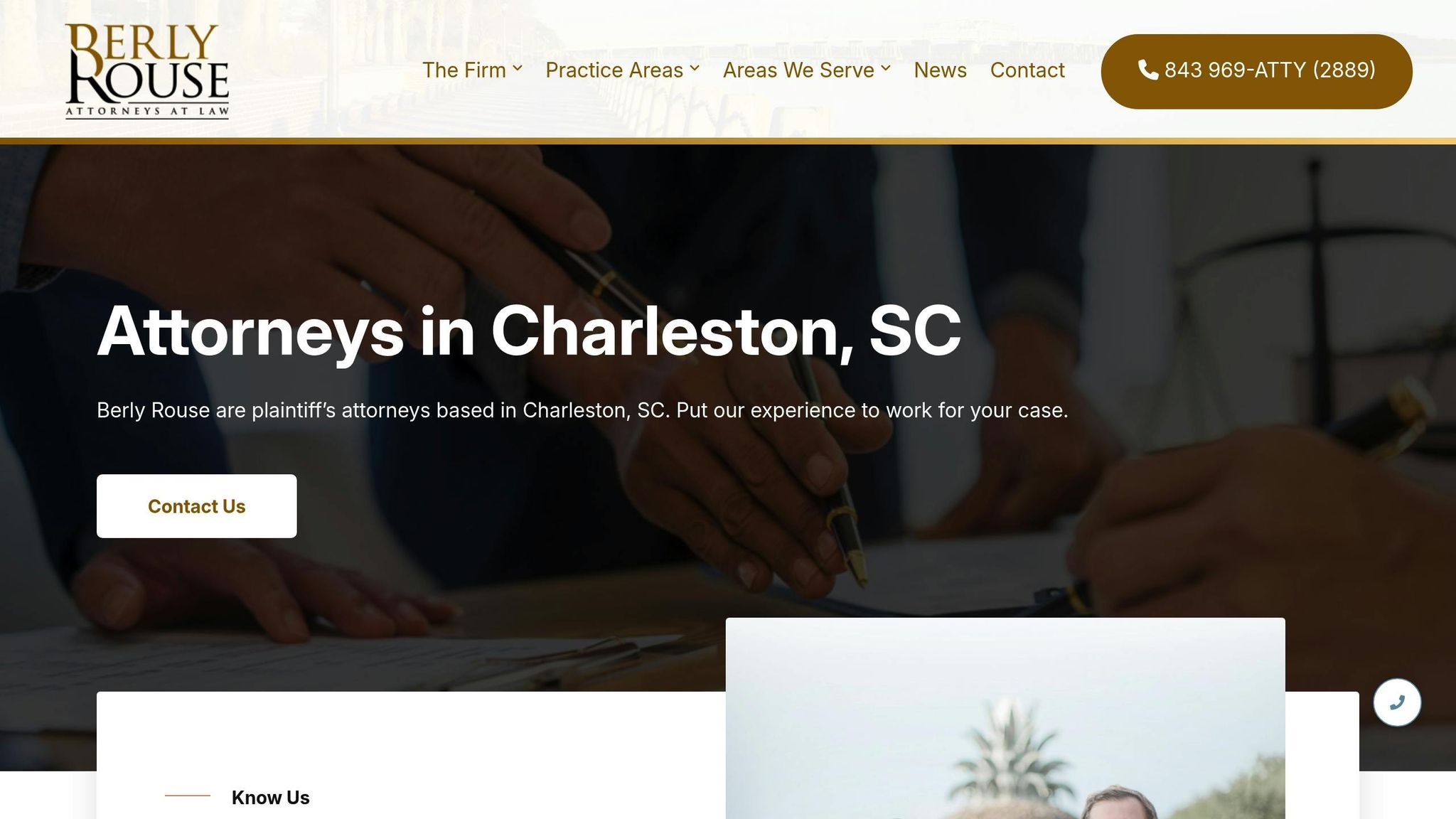Common Legal Mistakes SC Accident Victims Make
Story by Joel Berly
July 23, 2025

Accident victims in South Carolina often make costly legal mistakes that hurt their chances of fair compensation. Here’s what you need to know upfront:
- Leaving the scene without calling the police: This can lead to criminal charges and weakens your case. Always report accidents involving injury, death, or property damage over $1,000.
- Not collecting evidence: Photos, witness details, and medical records are critical. Without them, proving fault becomes harder.
- Delaying medical care: Waiting too long to see a doctor can reduce your settlement and make it harder to link injuries to the accident.
- Talking to insurance companies without legal help: Adjusters aim to minimize payouts. Avoid recorded statements and don’t sign anything without advice.
- Missing deadlines or not hiring a lawyer: South Carolina’s statute of limitations is three years for most personal injury claims. Waiting too long or going it alone can hurt your case.
Key takeaway: Protect your rights by acting quickly, documenting everything, and consulting an attorney to navigate South Carolina’s unique legal system.
Mistake 1: Leaving the Scene or Not Calling Police
After an accident, the initial shock can make you want to leave quickly, especially if the incident seems minor. But walking – or driving – away without notifying the police could lead to serious legal and financial trouble. In 2022, there were over 859,000 hit-and-run accidents in the United States. Many of these began as small fender-benders where drivers made impulsive, regrettable choices.
The consequences go far beyond insurance headaches. You could face criminal charges, steep fines, and even jail time if you fail to comply with South Carolina’s accident laws. What looks like a minor scrape can spiral into a legal mess if you don’t follow the rules.
What South Carolina Law Requires
South Carolina law is crystal clear: if you’re involved in an accident that results in injury, death, or property damage, you must stay at the scene. This applies no matter who is at fault or how insignificant the damage seems. Even if the other driver caused the crash, you’re legally required to stop, exchange information, and follow the state’s accident reporting process.
You’ll need to provide your name, address, vehicle registration number, and, if asked, your driver’s license number to everyone involved. Additionally, you are obligated to assist anyone who is injured. If someone needs medical help, you must call 911 immediately.
Here’s a breakdown of the penalties for leaving the scene, depending on the severity of the accident:
| Type of Accident |
Classification |
Jail Time |
Fine |
| Property damage only |
Misdemeanor |
Up to 30 days |
Up to $100 |
| Minor injuries |
Misdemeanor |
30 days to 1 year |
$100 to $5,000 |
| Great bodily injury |
Felony |
30 days to 10 years |
$5,000 to $10,000 |
| Fatality |
Felony |
1 to 25 years |
$10,000 to $25,000 |
South Carolina takes hit-and-run cases seriously. Convictions often result in losing your driving privileges, which can disrupt your daily life. Additionally, accidents involving injury, death, or property damage exceeding $1,000 must be reported to authorities. And since even minor car repairs can easily surpass $1,000, most accidents require official reporting. If the police don’t respond to the scene, you’ll need to file an accident report with the South Carolina DMV within 15 days.
Following these legal steps ensures proper documentation, which is crucial for insurance claims and legal protection.
How Police Reports Help Your Case
Given the strict legal requirements, police reports play a key role in protecting your interests. These reports provide an unbiased, official account of the accident that both insurance companies and courts heavily rely on. For context, South Carolina recorded 143,426 motor vehicle collisions in 2022, highlighting just how common accidents are – and the importance of thorough documentation.
"A police report is a powerful piece of evidence in a car accident claim, which is one reason you must report an accident immediately."
― Nowell Law Firm
Police reports include critical details you might miss in the heat of the moment: the time and location, weather and road conditions, vehicle descriptions, witness statements, and the officer’s observations. They also document whether any traffic laws were violated, and citations issued at the scene can strengthen your case if the other driver was at fault.
This official record not only clarifies what happened but also speeds up the claims process. Insurance companies often use the police report as their starting point when investigating an accident. Without it, adjusters may question whether the accident occurred at all or dispute key details about how it happened.
"Having a police report is an essential part of the evidence necessary to build your case."
― Law Office of Shane Smith
A police report also serves as an objective record in case of later disputes. Memories fade, and stories can change, but the details in the report remain consistent – making it a critical piece of evidence if your case ends up in court.
Obtaining a copy of the report is simple. The South Carolina DMV charges $6 for an official copy, while some local departments, like Greenville police, charge $3 per copy. Always review the report for accuracy, and if you find any mistakes, contact the police department immediately to have them corrected. Fixing errors early can save you from bigger problems down the line.
Mistake 2: Not Collecting and Saving Evidence
The aftermath of an accident can be chaotic, leaving you disoriented and unsure of what to do next. However, this is the most critical time to gather evidence. Many people focus solely on exchanging insurance information and arranging for their car to be towed, overlooking essential evidence that could strengthen their claim. This oversight can lead to reduced compensation and make it harder to hold the responsible party accountable.
Evidence doesn’t stick around forever. Surveillance footage gets erased, witnesses’ memories fade, and physical evidence – like vehicle damage – can change or disappear entirely. What seems obvious at the scene can become difficult to prove over time as details slip away.
In South Carolina, the responsibility to prove fault and document your injuries falls on you. Without strong evidence collected promptly, even a solid case can weaken. To protect your claim, it’s crucial to document everything immediately.
What Evidence You Need to Collect
Gathering evidence right after an accident is essential to building your case. Here’s what you should focus on:
- Photographs and Videos: Take pictures and videos of the accident scene from multiple angles. Include details like weather conditions, traffic signs, vehicle positions, road damage, skid marks, and any visible injuries. Both wide shots and close-ups are helpful for providing context.
- Witness Information: Get the names, phone numbers, and email addresses of any witnesses. Their written or recorded statements can add an unbiased perspective to your case.
- Driver and Vehicle Details: Collect the other driver’s full name, contact information, insurance policy details, driver’s license number, and vehicle information, including make, model, year, and license plate number.
- Medical Documentation: Seek medical attention right away, even if your injuries seem minor. Secure detailed records of your injuries and treatments to establish a clear link to the accident.
- Physical Evidence: Preserve any items from the scene that support your version of events, such as broken car parts, damaged clothing, or personal belongings. Keep these items in a safe place to avoid further damage.
Keep everything organized with timestamps. Store your photos, medical records, and witness statements in a dedicated file to create a clear timeline of events.
What Happens When Evidence Is Missing
Failing to collect thorough evidence can seriously weaken your case. Without clear documentation, you lose negotiating power and may struggle to prove fault. Insurance adjusters and opposing parties can easily challenge your account if there’s a lack of photos, witness statements, or medical records.
One of the biggest mistakes is not documenting your injuries promptly. If you don’t have medical records tying your injuries to the accident, insurers may argue that your injuries aren’t serious or weren’t caused by the crash, which can drastically reduce your compensation.
"Gathering and preserving compelling evidence is the key to building a strong personal injury case and securing fair compensation for damages."
There’s also the legal concept of spoliation of evidence, which can sometimes work in your favor. If the at-fault party or their insurer fails to preserve critical evidence, a judge may assume that the missing information would have supported your case. However, this only applies if they are responsible for the loss.
"It’s vital to make sure the at-fault party, also called the defendant, and the insurance company knows immediately you’re looking for this critical evidence."
Time is your enemy when it comes to evidence. Photos fade, vehicles get repaired, and surveillance footage is often overwritten within days. Delayed action can result in the permanent loss of crucial proof, making it much harder to build a strong case.
Losing key evidence can severely impact your ability to recover damages under South Carolina’s negligence laws, where proving the other party’s fault is essential to your claim.
Mistake 3: Waiting Too Long for Medical Care
After an accident, adrenaline can cloud your ability to recognize pain or symptoms. Injuries like whiplash or internal bleeding might not show up right away, and delaying medical care can make things worse – not just for your health but also for your ability to file a strong legal claim.
In South Carolina, many accident victims put off seeing a doctor. This can be dangerous, as untreated injuries may worsen over time. Plus, it weakens the connection between the accident and your injuries, which is crucial for any legal case. Getting checked out by a medical professional immediately protects both your health and your legal rights.
Seeing a doctor as soon as possible after an accident is crucial for two reasons: safeguarding your health and building a solid legal case. Sometimes, injuries don’t make themselves known right away, even if you feel fine. Visiting an emergency room, urgent care clinic, or your primary doctor ensures that all symptoms – even minor ones – are documented. Early treatment not only helps prevent complications but also creates a detailed medical record that could be vital if you pursue legal action.
Linking Your Injuries to the Accident
Just like gathering evidence at the accident scene, seeking prompt medical care establishes essential documentation for your case. Timely treatment protects your health and provides a clear record of your injuries. If you delay, gaps in your medical records can give insurance companies or defense attorneys room to argue that your injuries aren’t serious or weren’t caused by the accident. Following your doctor’s treatment plan and keeping all medical records strengthens your case and supports your claim for compensation.
In South Carolina, you have three years from the date of the accident to file a personal injury claim. However, the evidence you collect in the days and weeks after the incident can significantly impact your case. Detailed medical records are especially important when seeking compensation for ongoing medical expenses, lost wages, and pain and suffering. Sticking to your healthcare provider’s recommendations not only speeds up your recovery but also strengthens your legal position.
sbb-itb-7016c6e
Mistake 4: Talking to Insurance Companies Without Help
After an accident, insurance adjusters might come across as friendly and helpful, but don’t be fooled. Their main goal is to save their company money, often at your expense. Many accident victims in South Carolina make the error of speaking with adjusters without consulting an attorney first, which can lead to costly mistakes.
When you engage with an adjuster without legal guidance, you might unknowingly say something or sign paperwork that damages your case. Adjusters are skilled at pushing for quick, lowball settlements and may twist your words to downplay the seriousness of your injuries.
Problems with Recorded Statements
One tactic adjusters often use is requesting a recorded statement, claiming it’s a routine part of the process. What they don’t tell you is that these recordings can be used against you. Adjusters are trained to ask questions designed to trip you up, make you admit partial fault, or diminish the severity of your injuries.
For instance, they might ask how you’re feeling. A simple response like "I’m doing okay" could later be used to argue that your injuries aren’t severe. As Scott DeSalvo from the Law Office Of Scott D. DeSalvo, LLC, advises:
"I always recommend to people that you don’t do it [give a recorded statement]."
Adjusters may also intentionally delay the claims process to frustrate you into accepting a lower offer. They might argue your injuries aren’t connected to the accident or claim your medical treatment is unnecessary or overly expensive. This is why it’s critical to avoid recorded statements and never sign anything without legal advice.
Why You Shouldn’t Sign Medical Releases or Quick Settlements
Insurance companies often pressure accident victims to sign medical release forms or accept quick settlements before they fully understand the scope of their injuries. These actions can have serious repercussions.
Signing a medical release gives insurers access to your entire medical history, even unrelated records. This allows them to comb through your past for pre-existing conditions to argue that your injuries weren’t caused by the accident. Alarmingly, nearly 30% of personal injury claims are denied or reduced due to alleged inconsistencies in medical records.
Here’s why these medical releases are problematic:
| Medical Release Trap |
Why It’s a Problem |
| Unlimited access |
Grants insurers access to your entire medical history |
| No provider limits |
Lets them contact any doctor you’ve ever seen |
| Excessive scope |
Includes unrelated issues like mental health or past injuries |
| Direct doctor contact |
Allows insurers to speak with your doctors without you present |
Quick settlements are another trap. Once you agree to a settlement, your claim is closed – even if new medical issues arise later. These initial offers are usually much lower than what you’re entitled to, and signing a liability release prevents you from seeking additional compensation if your condition worsens. To avoid these pitfalls, consult an attorney who can protect your rights.
Handling Insurance Claims Alone vs. With an Attorney
Navigating insurance claims on your own can be overwhelming, especially when dealing with professionals trained to minimize payouts. Having an attorney on your side can make a huge difference in the outcome of your case.
| Aspect |
Handling Claims Alone |
With Legal Representation |
| Communication |
Direct dealings with adjusters who may twist your words |
An attorney handles all communication, safeguarding your rights |
| Settlement Evaluation |
Limited understanding of fair compensation |
Expert assessment of current and future expenses |
| Negotiation Power |
Minimal leverage against trained professionals |
Strong negotiator familiar with insurance tactics |
| Legal Knowledge |
Unaware of South Carolina’s comparative negligence laws |
Deep understanding of state laws and their impact on your case |
| Time and Stress |
Balancing your claim while recovering from injuries |
Focus on healing while your attorney manages the case |
| Documentation |
Risk of missing key evidence or deadlines |
Thorough evidence collection and deadline tracking |
South Carolina follows a modified comparative negligence rule, meaning your compensation can be reduced if you’re found partially at fault. Insurance companies often exploit this to shift blame. An experienced attorney knows how to counter these tactics and ensure your interests are protected.
Having legal representation not only strengthens your case but also provides peace of mind. With an attorney handling the complexities, you can focus on recovery while knowing your rights are being defended and your compensation maximized.
Mistake 5: Not Getting a Lawyer and Missing Deadlines
Many accident victims make the mistake of delaying legal help or attempting to handle their cases on their own. Unfortunately, this can result in missed deadlines that permanently eliminate their chance to seek compensation. Overlooking critical timelines or legal requirements can have long-lasting consequences.
South Carolina’s Time Limits for Filing Claims
Being aware of filing deadlines is essential to avoid costly delays. South Carolina law imposes specific timeframes – known as statutes of limitations – for various injury claims. For most personal injury cases, you typically have three years from the date of the accident or injury to file a claim. However, personal injury cases often involve complexities where even minor delays can jeopardize your case.
It’s important to note that the three-year rule doesn’t apply to every situation. Several exceptions can either shorten or extend the deadline:
- Government-related accidents: If your case involves city buses, county vehicles, or state employees, you generally have two years to file a claim.
- Workplace injuries: These must be reported within 90 days, and workers’ compensation claims must be filed within two years of the accident.
- Cases involving minors: If the injured person was under 18 at the time of the incident, they may have until one year after their 18th birthday to file a claim.
- Medical malpractice: While most cases follow the three-year rule, some circumstances allow for an extended deadline of up to six years.
- Mental incapacitation: If the injured party is mentally incapacitated, the statute of limitations may be paused until they regain mental capacity.
These variations highlight the importance of seeking legal advice as soon as possible. As Rosen Hagood, a legal expert, emphasizes:
"These deadlines are critical and if you miss these deadlines, you may be barred from bringing your case regardless of the severity of your injuries."

Taking swift legal action is key to protecting your rights and avoiding costly mistakes. This is where experienced legal representation can make all the difference. Berly Rouse Attorneys has decades of experience handling personal injury cases throughout South Carolina.
Their deep understanding of South Carolina’s specific statutes and legal precedents ensures that your claim meets all necessary requirements and deadlines. Additionally, their familiarity with local courts, judges, insurance companies, and medical providers gives you a distinct advantage.
The firm takes a client-first approach, tailoring their strategy to the unique details of your case [67,68]. They are also seasoned trial lawyers prepared to take your case to court if necessary – an approach that often pushes insurance companies to settle fairly. Whether your case involves car accidents, medical malpractice, nursing home abuse, product liability, or wrongful death, they handle a wide range of personal injury claims [67,68].
With Berly Rouse Attorneys, you don’t need to worry about upfront costs. They work on a contingency fee basis, meaning you only pay if they win your case. Plus, they offer free consultations to help you explore your legal options [68,69].
Getting legal help early ensures that evidence is preserved, deadlines are met, and your case is built effectively while you focus on recovery. Don’t let the clock run out – contact Berly Rouse Attorneys today for a free consultation and take the first step in protecting your rights.
Conclusion: Learning the Law Helps You Win
Understanding South Carolina’s accident laws is key to protecting your rights and ensuring you’re prepared after an accident. Knowing the steps to take – and the pitfalls to avoid – can make all the difference between receiving fair compensation and dealing with unnecessary financial burdens. These basics are crucial for navigating the aftermath of an accident.
Key Takeaways for South Carolina Accident Victims
South Carolina follows an at-fault system and applies a modified comparative negligence rule, meaning that fault and timing play a critical role in your ability to recover damages. By understanding these rules, you can better evaluate your insurance coverage and determine if you’re entitled to additional compensation. Missing the three-year statute of limitations, for example, could result in losing your right to seek compensation entirely.
Mistakes such as misjudging fault or overlooking important deadlines can be avoided with a solid grasp of the law.
As highlighted:
"Understanding the car accident laws in South Carolina is essential for every driver, as it can greatly impact the outcome of a case."
The Value of Professional Legal Support
Navigating these legal complexities can be overwhelming, but the right legal help can make all the difference. Studies show that individuals who hire personal injury lawyers often receive higher settlements than those who handle cases on their own. Attorneys specializing in personal injury bring a deep understanding of liability rules, statutes of limitations, and legal procedures. They can assess your claim accurately and work to secure the maximum compensation you’re entitled to.
Most experienced personal injury attorneys work on a contingency basis, meaning you pay only if they win your case. This arrangement ensures you can access skilled legal representation without worrying about upfront fees. For South Carolina accident victims, firms like Berly Rouse Attorneys offer trusted expertise and proven results.
Dealing with fault determinations, legal deadlines, and insurance negotiations is no small task. The stakes are simply too high to face alone. With professional legal support, you can protect your rights and pursue the compensation you deserve.
FAQs
What steps should I take right after a car accident in South Carolina to protect my legal rights?
If you find yourself in a car accident in South Carolina, what you do next can greatly influence your legal standing. First, prioritize safety – check yourself and others for injuries. Then, call the police to report the accident, no matter how minor it seems. Having an official report can be crucial later on. If anyone is hurt, get medical help right away, even if the injuries appear minor at first.
Make sure to document everything. Take photos of the vehicles, any damage, road conditions, and visible injuries. Exchange insurance and contact details with the other driver, but steer clear of admitting fault or making assumptions about what happened. These steps can protect your rights and provide essential evidence if you need to pursue legal action later.
Delaying medical care after an accident can have serious consequences for both your health and your personal injury case. Getting checked out by a doctor right away helps ensure your injuries are properly identified and treated, reducing the risk of complications or worsening conditions.
From a legal standpoint, putting off treatment can weaken your claim. Insurance companies might argue that your injuries aren’t related to the accident or that they’re less severe than you claim. This can lead to reduced compensation – or even a denial of your claim altogether. To safeguard your health and strengthen your case, it’s essential to seek medical attention immediately after an accident.
Why should I talk to an attorney before dealing with insurance adjusters after an accident?
Before talking to insurance adjusters, it’s a smart move to consult with an attorney to safeguard your rights and your claim. Keep in mind, insurance adjusters work for the insurance company, and their primary goal is often to keep payouts as low as possible. An attorney can help you avoid saying anything that might unintentionally hurt your case or reduce the compensation you’re entitled to.
With the help of an experienced attorney, you’ll have someone to guide you through the claims process, provide an objective evaluation of your case, and identify the full value of your claim – including damages you might not have even thought about. This puts you in a stronger position to pursue a fair resolution.
Related posts
Categories: Uncategorized




